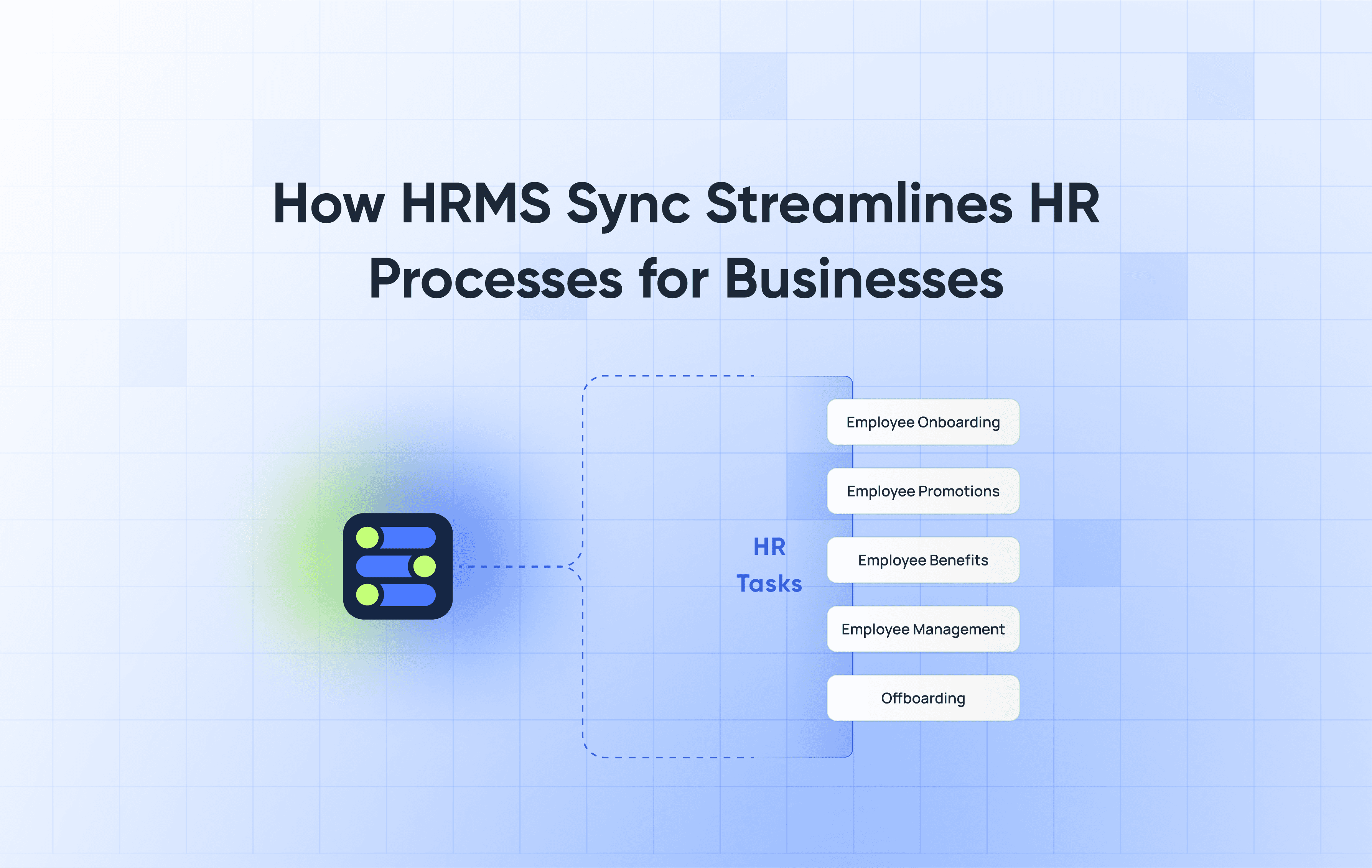
Sep 23, 2024
How HRMS Sync Streamlines HR Processes for Businesses
Human Resources departments often grapple with the complexities of managing vast amounts of employee data. Every action requires accurate, timely data, from onboarding employees to their promotions, managing employee benefits programs, and offboarding. The stakes are even higher for service providers working with these organizations—whether in banking, insurance, or corporate travel. They rely on this data to offer accurate services and avoid delays that can cost them and their clients dearly.
This is where HRMS Sync comes into play. It offers a seamless, automated solution to streamline data exchange between organizations and service providers. In this blog, we'll explore five ways HRMS Sync can transform and simplify HR processes, ensuring efficiency and reliability at every step.
Automating Data Transfers for Accuracy and Speed
One of the most time-consuming tasks for HR departments is manually updating service providers about changes in employee details. Typically, this involves exporting data from the HR management system (HRMS) and sending it to the provider via CSV files. This process is error-prone and delays updating critical information, such as new hires, terminations, or changes in salary.
How HRMS Sync Helps:
HRMS Sync automates this data-sharing process through its unified API, which integrates with over 70 different HRMS platforms. Organizations can select specific data points they wish to share, and service providers can directly access updated employee information whenever needed. This automation reduces errors, speeds up data transmission, and ensures that all parties have access to the most current information.
Use Case Example:
A corporate bank that uses HRMS Sync can instantly access updated employee verification documents, reducing account opening times by 50% and enhancing the onboarding experience for new clients.
Enhancing Compliance with Regulatory Standards
With the growing emphasis on data privacy and security and adhering to regulatory standards, HR departments and service providers must ensure that employee data is handled securely and only shared with authorized parties.
How HRMS Sync Helps:
HRMS Sync's robust functionality allows organizations to set automated data-sharing rules that comply with regulations. It ensures that sensitive employee information is shared securely and encrypted during data transfers, simplifying compliance and minimizing the risk of data breaches.
Use Case Example:
A health insurance provider using HRMS Sync can create specific rules for sharing health-related data, ensuring that only authorized personnel have access, thereby reducing the risk of non-compliance penalties.
Streamlining Employee Administration
Managing employee administration—such as health insurance, retirement plans, and wellness programs—can be a nightmare for the service provider’s admin, especially when dealing with inaccurate or outdated data. Delays in these employee benefits administration often result in employee dissatisfaction.
How HRMS Sync Helps:
With HRMS Sync, employee benefits providers can access real-time updates on employee eligibility and status directly from the HRMS. This ensures that the employee benefits program process is smooth, accurate, and timely, reducing errors and enhancing employee satisfaction.
Use Case Example:
An employee benefits provider using HRMS Sync can automatically receive updates about an employee’s status changes, such as promotions or changes in dependent status. This allows them to adjust benefits coverage promptly, reducing administrative burdens and ensuring employees receive their benefits without delays.
Boosting Operational Efficiency for Service Providers
Service providers, such as banks, insurance firms, and access management companies, often face operational challenges due to delays in receiving updated employee data from their client organizations. This can hinder service delivery and impact customer satisfaction.
How HRMS Sync Helps:
HRMS Sync eliminates these bottlenecks by providing real-time data updates through seamless integration with HRMS platforms. Service providers can access the necessary information on demand, streamlining their operations and improving service delivery times.
Use Case Example:
An IT company using HRMS Sync can synchronize its access management systems with real-time HR data, ensuring that employee roles or status changes are immediately reflected in access rights. This reduces security risks and operational inefficiencies.
Conclusion
HRMS Sync is more than just an employee data-sharing tool. It’s a powerful solution transforming how organizations and service providers handle employee data. By automating data transfers, ensuring compliance, streamlining employee administration, and enhancing operational efficiency, HRMS Sync empowers businesses to deliver better services.
HRMS Sync is an invaluable tool that delivers measurable accuracy, compliance, and efficiency improvements for any organization or service provider looking to optimize its HR processes. By embracing this solution, businesses can focus on what truly matters—building better relationships and delivering exceptional service to their clients and employees.
Whether in banking, insurance, corporate travel, or any other industry that relies on timely and accurate employee data, HRMS Sync can be your strategic partner in achieving streamlined operations and satisfied customers. For more information on integrating your client’s HRMS with HRMS Sync, contact support@tartanhq.com.
Pramey Jain
CEO & Founder




